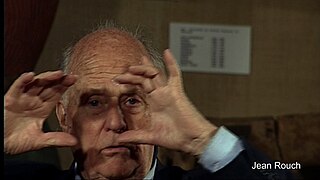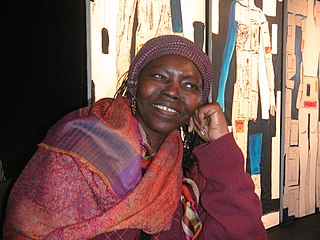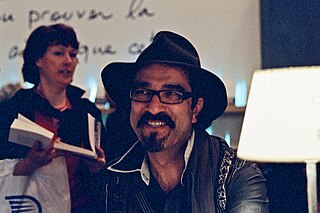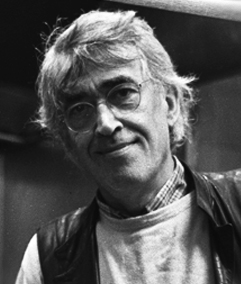
Chris Marker was a French writer, photographer, documentary film director, multimedia artist and film essayist. His best known films are La Jetée (1962), A Grin Without a Cat (1977) and Sans Soleil (1983). Marker is usually associated with the Left Bank subset of the French New Wave that occurred in the late 1950s and 1960s, and included such other filmmakers as Alain Resnais, Agnès Varda and Jacques Demy.
Cinéma vérité is a style of documentary filmmaking developed by Edgar Morin and Jean Rouch, inspired by Dziga Vertov's theory about Kino-Pravda. It combines improvisation with use of the camera to unveil truth or highlight subjects hidden behind reality. It is sometimes called observational cinema, if understood as pure direct cinema: mainly without a narrator's voice-over. There are subtle, yet important, differences between terms expressing similar concepts. Direct Cinema is largely concerned with the recording of events in which the subject and audience become unaware of the camera's presence: operating within what Bill Nichols, an American historian and theoretician of documentary film, calls the "observational mode", a fly on the wall. Many therefore see a paradox in drawing attention away from the presence of the camera and simultaneously interfering in the reality it registers when attempting to discover a cinematic truth.

Jean Rouch was a French filmmaker and anthropologist.
Steve James is an American film producer and director of several documentaries, including Hoop Dreams (1994), Stevie (2002), and Abacus: Small Enough to Jail (2016).

Cinema of Africa is both the history and present of the making or screening of films on the African continent, and also refers to the persons involved in this form of audiovisual culture. It dates back to the early 20th century, when film reels were the primary cinematic technology in use. During the colonial era, African life was shown only by the work of white, colonial, Western filmmakers, who depicted Africans in a negative fashion, as exotic "others". As there are more than 50 countries with audiovisual traditions, there is no one single 'African cinema'. Both historically and culturally, there are major regional differences between North African and sub-Saharan cinemas, and between the cinemas of different countries.
Chronicle of a Summer is a 1961 French documentary film shot during the summer of 1960 by sociologist Edgar Morin and anthropologist and filmmaker Jean Rouch, with the technical and aesthetic collaboration of Québécois director-cameraman Michel Brault.

Cinema was introduced in Afghanistan at the beginning of the 20th century. Political troubles slowed the indusry over the years. However, numerous Pashto and Dari films have been made both inside and outside Afghanistan throughout the 20th century. The cinema of Afghanistan entered a new phase in 2001, but has failed to recover to its popular pre-war status.
The Cinema of Niger began in the 1940s with the ethnographical documentary of French director Jean Rouch, before growing to become one of the most active national film cultures in Francophone Africa in the 1960s-70s with the work of filmmakers such as Oumarou Ganda, Moustapha Alassane and Gatta Abdourahamne. The industry has slowed somewhat since the 1980s, though films continue to be made in the country, with notable directors of recent decades including Mahamane Bakabe, Inoussa Ousseini, Mariama Hima, Moustapha Diop and Rahmatou Keïta. Unlike neighbouring Nigeria, with its thriving Hausa and English-language film industries, most Nigerien films are made in French with Francophone countries as their major market, whilst action and light entertainment films from Nigeria or dubbed western films fill most Nigerien theatres.

Docufiction is the cinematographic combination of documentary and fiction, this term often meaning narrative film. It is a film genre which attempts to capture reality such as it is and which simultaneously introduces unreal elements or fictional situations in narrative in order to strengthen the representation of reality using some kind of artistic expression.
Ethnofiction refers to a subfield of ethnography which produces works that introduces art, in the form of storytelling, "thick descriptions and conversational narratives", and even first-person autobiographical accounts, into peer-reviewed academic works.

Safi Faye is a Senegalese film director and ethnologist. She was the first Sub-Saharan African woman to direct a commercially distributed feature film, Kaddu Beykat, which was released in 1975. She has directed several documentary and fiction films focusing on rural life in Senegal.

Atiq Rahimi is a French-Afghan writer and filmmaker.
Malek Shafi’i is a film director, producer, festival organiser, and human rights activist from Afghanistan.
The February 2010 Kabul attack on 26 February 2010 was a combined suicide bombing and shooting attack. A car bomb levelled the Arya Guesthouse, also known as the Hamid Guesthouse, popular with Indian doctors. Two armed attackers then entered the nearby Park Residence, housing other foreigners. One detonated a suicide bomb, and the other was shot dead. The Safi Landmark Hotel nearby was badly damaged by the blasts. At least 18 people were killed and 36 more were injured.

Ethnocinema, from Jean Rouch’s cine-ethnography and ethno-fictions, is an emerging practice of intercultural filmmaking being defined and extended by Melbourne, Australia-based writer and arts educator, Anne Harris, and others. Originally derived from the discipline of anthropology, ethnocinema is one form of ethnographic filmmaking that prioritises mutuality, collaboration and social change. The practice's ethos claims that the role of anthropologists, and other cultural, media and educational researchers, must adapt to changing communities, transnational identities and new notions of representation for the 21st century.

Vincent Blanchet was a French filmmaker, documentary teacher and inventor of microphones.

Judy Hoffman is an American filmmaker and arts activist based in Chicago. She graduated from Northwestern University with a MFA and currently holds a faculty position at the University of Chicago. Hoffman has played a major role in the development of Kartemquin Films, a documentary filmmaking company founded in Chicago in 1966. Hoffman has worked with extensively with Kwakwaka’wakw, a First Nation in British Columbia, to produce films. Hoffman has brought activism to her films, and continues to show different facets of the city of Chicago.

Shahrbanoo Sadat is an Afghan filmmaker born in Tehran, Iran.

The Human Pyramid is an 1961 Ivorian docufiction film directed by Jean Rouch. Rouch forced black African and white French students to improvise interactions with each other at an integrated high school in Abidjan.
Richard De Medeiros is a Beninese film director.











